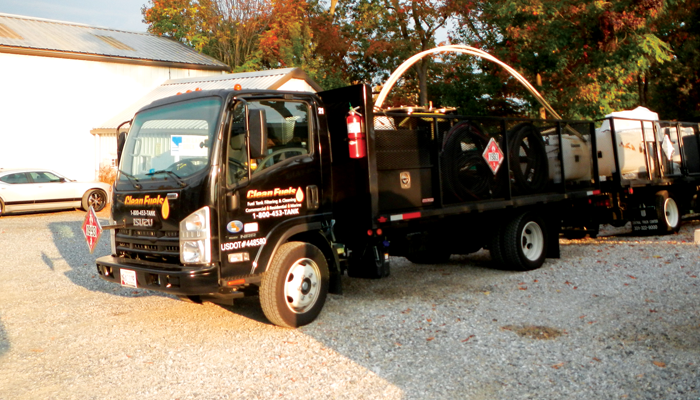NFPA 110 compliance work and ethanol problems create opportunities
Fuel retailers can generate new business in the areas of fuel polishing and tank cleaning by partnering with Clean Fuels Associates, a Maryland-based company that has a New Hampshire office and is rapidly expanding its Northeast locations and services.
Clean Fuels partners with retailers to provide fuel cleaning and tank cleaning for their clients, according to Sam Estill, Director of Operations. Companies can arrange compliance-related fuel services for select commercial clients to help them meet the requirements of National Fire Protection Association (NFPA) 110, which is the standard for emergency and standby power systems.
NFPA 110 imposes requirements on stored fuel at both public and private facilities that are mandated to maintain emergency backup power systems. These include hospitals, nursing homes, parking garages and other facilities where emergency exit and life safety are mission critical. The standard imposes maintenance rules for the backup systems themselves and also for the fuel they use. “Generators covered by NFPA 110 that use diesel are required to maintain fuel that meets the ASTM D 975 standard for diesel,” said Chief Compliance Officer David Bishop
Compliance Testing
To meet the fuel quality standard, operators are required to test the diesel once a year and certify that it meets the ASTM specification. Clean Fuels provides NFPA fuel testing directly for its own clients and also for customers of its fuel delivery clients. Estill recommends that compliance sites be scheduled for annual service.
The company also serves fuel customers of all types and sizes with fuel and tank cleaning that are unrelated to compliance. Estill said customers include fuel terminals, service stations, boat owners, generator owners and anyone else who stores fuel. “We clean all sizes of tank from 30 gallons to 3 million gallons,” he said. Clean Fuels responds to emergency calls and also provides preventive maintenance services.
Clean Fuels cleans diesel fuel by removing it from the tank and circulating it through a filtration system for about 25 seconds before returning it to the tank, minus the sediment and impurities that are removed. “It’s like kidney dialysis for fuel,” Estill explained. The company operates filtration systems in different sizes for different tank sizes with flow rates ranging from 10 gallons per minute to 250 gallons per minute. There is no downtime for the tank, and cleaning a 10,000-gallon tank could take one-and-a-half to two-and-a-half hours.
To clean the contents of a tank, the operator inserts a long, flexible wand into the tank through the top and other openings to draw fuel from the bottom of the tank. “We pull from the lowest end of the tank first. It’s the business end of the tank cleaning process,” Estill explained. “We pull the fuel through sediment filters and oil/water separators on our dual canister system. It could take fuel a total of 25 seconds to circulate through the hose, filtration system and back into the tank.
“Failing to remove the dead bodies of bacteria can cause more problems for the tank itself than the live bacteria,” he added. “This is often overlooked by tank owners when they utilize a treatment or biocide throughout the year. We use a biocide at time of service so we can kill all microbes, and then polish the entire tank and fuel so we can guarantee complete removal of all foreign matter.”
Ethanol Problems
The increased blending of ethanol in gasoline has been a business driver for Clean Fuels, because ethanol blends cause tank problems, according to Estill. The ethanol bonds with water and settles to the bottom of the tank, where it causes corrosion.
Diesel and heating oil have similar problems, because water forms inside the tank and “acts like a Petri dish, creating a friendly environment for bacteria and fungus. The micro-organisms eat away at the cetane in the fuel and create contaminants that can clog equipment and damage tank components, Estill said.
Clean Fuels advocates preventive maintenance for fuels and tanks in the form of annual fuel and tank cleaning. Customers can sign on for maintenance contracts of up to five years. “If you take care of the tank, the tank will take care of you,” said Christian Dalhby, Lead Salesman. Clean Fuels has learned from its work with boat tanks that professionals can be great sources of business, he added.
Pricing depends on the number of units to be cleaned. For example,
a service station owner with multiple sites can get a better price than an operator who wants just one tank cleaned. When working with partners such as heating oil dealers, Clean Fuels provides a wholesale price that the dealer can mark up for customers.
“We want to be the brand name in aftermarket fuel purification across America,” Estill said. “Many retailers are happy to say they are offering ‘Clean Fuels tank services’ as part of their services.”
Expansion Plans
Clean Fuels Associates is in the middle of a major expansion. “For 24 years Clean Fuels operated with primarily a Mid-Atlantic focus.” Estill explained. “We serviced Northern Virginia, Pennsylvania, Maryland, Washington, D.C., and Delaware in all those years. There was a very strong concentration on the marine and light commercial work as well as the beginning of retail relationships.”
Since 2010, the Hartman family, which owns Clean Fuels, has added a management team and focused on expansion. The company maintains an office in Dover, N.H. with its sights set on locations in Buffalo, N.Y., and Albany, N.Y., in the Northeast. They currently serve the eastern United States and the Gulf Coast with four other locations. Clean Fuels is registered in 28 states currently with 15 additional Midwest and western states filed as of 2013. The company plans to offer services nationwide and into Canada by 2018.
For more information call Clean Fuels at (800) 453-TANK or visit www.CleanFuelsAssociates.com.


